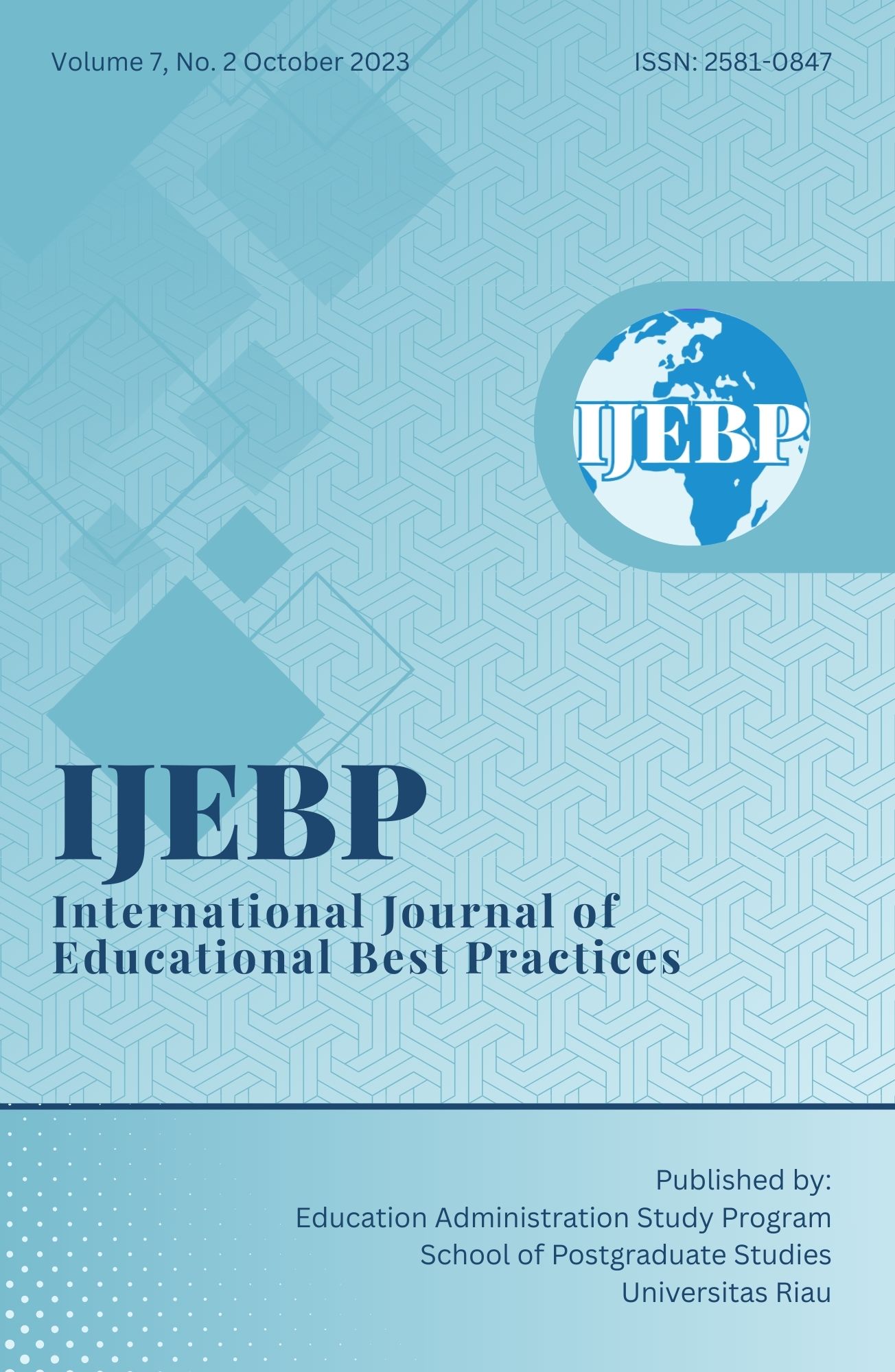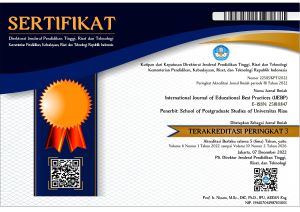THE TEACHERS’ MOTIVATING FACTORS IN TEACHING TOEFL AND IELTS TEST PREPARATION IN A PRIVATE INSTITUTION IN PEKANBARU, INDONESIA
DOI:
https://doi.org/10.31258/ijebp.7.2.217-234Keywords:
Teachers' motivations, TOEFL and IELTS, Test preparation courseAbstract
Many studies concentrate on the motivations of teachers in educational settings and with regard to teaching English as a foreign language. The motivations of teachers in a privatized environment like an English language centre would thus be interesting to research. The aim of the study was to investigate the teachers’ motivations in teaching TOEFL and IELTS test preparation by employing a qualitative approach with a case study. The purposive sampling method was used to recruit 10 teachers who had been instructing TOEFL and IELTS for more than ten years in one of the language training institutions in Pekanbaru. Four of the teachers had master's degrees in education and TESOL, while the others had bachelor's degrees with majors in English education. The data were gathered in person via audiotaped semi-structured interviews, and thematic analysis, as described by Braun & Clarke (2012), was used to examine the data. It was discovered that the factors that drove teachers to teach TOEFL and IELTS were: 1) their passion for teaching; 2) their test score improvement; 3) their self-development; 4) their satisfaction in helping students; 5) no required lesson plans; and 6) salary and career building.
References
Alipour, S. (2018). Comparison of Private-Institute and Public-School English Teachers' Motivation towards Teaching English in Iran. Cypriot Journal of Educational Sciences, 13(4), 631-644. https://doi.org/10.18844/cjes.v13i4.3600
Al-Rawashdeh, H. (2011). Difficulties That Face Graduate Students During Their TOEFL Preparation Program at Jordanian University. Abhath Al-Yarmouk Hum. & Soc. Sci, 2307–2329.
Andrade, C. (2021). The Inconvenient Truth About Convenience and Purposive Samples. Indian Journal of Psychological Medicine, 43(1), https://doi.org/10.1177/0253717620977000
Babbie, E. R. (2007). The Practice of Social Research. Thomson Wadsworth. 86–88.
Bernard, H. R. (2017). Research Methods in Anthropology: Qualitative and Quantitative Approaches. Rowman & Littlefield.
Braun, V., & Clarke, V. (2012). Thematic Analysis. In APA Handbook of Research Methods in Psychology, Vol 2: Research Designs: Quantitative, Qualitative, Neuropsychological, And Biological. (Pp. 57–71). American Psychological Association. https://doi.org/10.1037/13620-004
Cohen, L., Manion, L., & Morrison, K. (2002). Research Methods in Education. Routledge.
Creswell, J. W., & Creswell, J. D. (2017). Research Design: Qualitative, Quantitative, and Mixed-Methods Approaches. Sage Publications.
Dewaele, J.-M. (2020). “What Psychological, Linguistic and Sociobiographical Variables Power EFL/ESL Teachers’ Motivation,” In the Emotional Rollercoaster of Language Teaching. eds. C. Gkonou, J.-M. Dewaele, and J. King (Bristol: Multilingual Matters), 269–287.https://doi.org/10.21832/9781788928342-019
Dweik, B. S., & Awajan, N. W. (2013). Factors that Enhance English Language Teachers’ Motivation in Jordanian Secondary Schools. English Linguistics Research, 2(1). https://doi.org/10.5430/elr.v2n1p33
Flick, U. (2009). An Introduction to Qualitative Research. Sage Publications. Guba, E. G. (1981). Criteria for Assessing the Trustworthiness of Naturalistic Inquiries. ECTJ, 29(2), 75-91. https://doi.org/10.1007/BF02766777
Gubrium, J. F., & Holstein, J. A. (2016). From the Individual Interview to The Interview Society. In Handbook of Interview Research (Pp. 2–32). SAGE Publications, Inc. https://doi.org/10.4135/9781412973588.n3
Han, J., & Yin, H. (2016). Teacher Motivation: Definition, Research Development and Implications for Teachers. In Cogent Education (Vol. 3, Issue 1). Taylor And Francis Ltd. https://doi.org/10.1080/2331186X.2016.1217819
Hettiarachchi, S. (2013). English Language Teacher Motivation in Sri Lankan Public Schools. Journal of Language Teaching and Research, 4(1).
https://doi.org/10.4304/jltr.4.1.1-11
Kyriacou, C., Hultgren, Å., & Stephens, P. (1999). Student Teachers’ Motivation to Become A Secondary School Teacher in England And Norway. Teacher Development, 3(3), 373–381. https://doi.org/10.1080/13664539900200087
Lapan, S. D., Quartaroli, M. T., & Riemer, F. J. (Eds.). (2011). Qualitative Research: An Introduction to Methods and Designs (Vol. 37). John Wiley & Sons. Leavy, P. (Ed.). (2014). The Oxford Handbook of Qualitative Research. Oxford University Press, USA.
Lenaini, I. (2021). Teknik Pengambilan Sampel Purposive Dan Snowball Sampling. Historis: Jurnal Kajian, Penelitian Dan Pengembangan Pendidikan Sejarah [Purposive Sampling and Snowball Sampling Technique. Historical: Journal of History Education Studies, Research and Development], 6(1), 33-39. https://doi.org/10.31764/historis.v6i1.4075
Merriam, S. B., & Tisdell, E. J. (2015). Qualitative Research: A Guide to Design and Implementation. John Wiley & Sons.
Moore, A. (2018). Anonymity, Pseudonymity, And Deliberation: Why Not Everything Should Be Connected. Journal of Political Philosophy, 26(2), 169–192. https://doi.org/10.1111/jopp.12149
Ng, C. F., & Ng, P. K. (2015). The Motivation of English Language Teachers in A Language Centre. International Journal of Languages, Literature and Linguistics, 1(2), 87-92. https://doi.org/10.7763/IJLLL.2015.V1.18
Ofoegbu, F. I. (2004). Teacher Motivation: A Factor for Classroom Effectiveness and School Improvement in Nigeria. College Student Journal, 38(1), 81-90. https://doi:10.3126/nelta.v17i1-2.8089
Pourbahram, R., & Sadeghi, K. (2020). English As A Foreign Language Teachers' Immunity and Motivation: Public Schools Vs. Private Institutes. Teaching English Language, 14(2), 291-321. https://doi.org/10.22132/tel.2020.125905
Pourtoussi, Z., Ghanizadeh, A., & Mousavi, V. (2018). A Qualitative In-Depth Analysis of the Determinants and Outcomes of EFL Teachers' Motivation and Demotivation. International Journal of Instruction, 11(4), 175-190. https://doi.org/10.12973/iji.2018.11412a
Roza, D. (2019). The Challenges and Strategies in Teaching TOEFL and IELTS Test Preparation. Journal of English for Academic, 6(2), 2019.
Sahito, Z., & Vaisanen, P. (2018). Perception and Experience of Teacher Educators about Their Motivation: A Case Study Approach. Journal of Language Teaching and Research, 9(3), 480. https://doi.org/10.17507/jltr.0903.05
Sharma, G. (2017). Pros and Cons of Different Sampling Techniques. International Journal of Applied Research, 3(7), 749-752. https://dx.doi.org/10.22271/allresearch
Sherman, R. R., & Webb, R. B. (2004). Qualitative Research in Education. Routledge. Sinclair, C., Dowson, M., & McInerney, D. M. (2006). Motivations to Teach: Psychometric Perspectives Across the First Semester of Teacher Education. In Teachers College Record (Vol. 108, Issue 6, Pp. 1132–1154). Teachers College, Columbia University. https://doi.org/10.1111/j.1467-9620.2006.00688.x
Smid, D. (2018). Hungarian Pre-Service Teachers’ Motivation to Become English Teachers: Validating A Questionnaire. Journal of Adult Learning, Knowledge and Innovation, 2(1), 19–32. https://doi.org/10.1556/2059.02.2018.02
Tsutsumi, R. (2014). Exploring Japanese University EFL Teacher Motivation. Journal of Pan-Pacific Association of Applied Linguistics, 18(1), 121-143. https://eric.ed.gov/?id=EJ1047525
Yin, R. K. (2015). Qualitative Research from Start to Finish. Guilford Publications.





